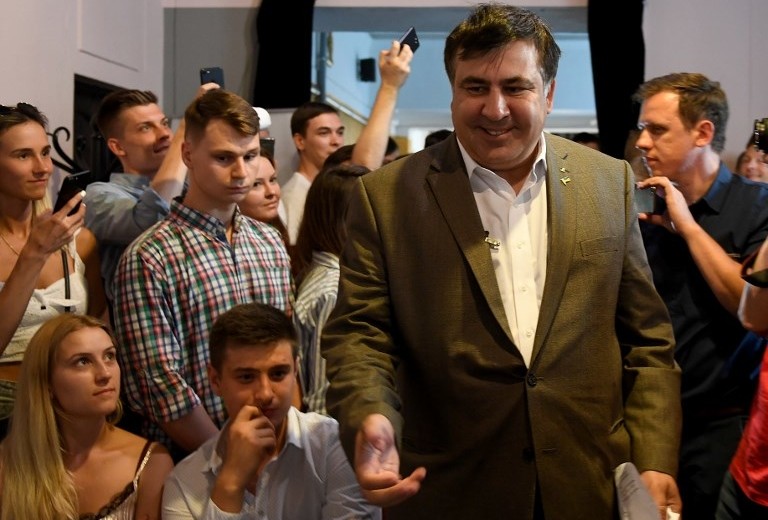Authorities in Georgia have sent Ukraine’s Justice Ministry an extradition request for ex-Georgian President Mikheil Saakashvili, Ukraine’s Deputy Justice Minister Serhiy Petukhov said at a news conference on Sept. 5.
The request concerns four criminal cases into alleged embezzlement, abuse of power and abuse of power with the use of force, Petukhov said. Ukrainian authorities have begun to consider his extradition, he added.
“This only increases my confidence in what I’m doing,” Saakashvili told NewsOne television on Sept. 5. “I will go back to Ukraine.”
He said that the authorities were afraid of him.
“(President Petro) Poroshenko is so afraid of me that he’s coming up with new stuff all the time,” Saakashvili said. “He thinks I’ll be scared. But it’s them who are scared – they’re afraid of me more than of the enemy in the east.”
In 2015 Ukraine rejected two previous extradition requests from Georgia for Saakashvili, arguing that the move had been politically motivated. The previous requests concerned criminal cases into alleged embezzlement, abuse of power during crackdowns on opposition TV channel Imedi and on demonstrators and an attack on lawmaker Valery Gelashvili.
Saakashvili’s ally David Sakvarelidze told the Kyiv Post the cases in the current extradition request were different from the ones involved in the previous requests. Petukhov declined to comment on how this request was different from the previous one.
If Ukrainian authorities believe Saakashvili doesn’t have a legal link to Ukraine anymore, they had no right to accept this extradition request, Saakashvili’s lawyer Markiyan Halabala told the Kyiv Post.
But if they consider Saakashvili a stateless permanent resident of Ukraine, they must let him into the country because such residents have a right to enter Ukraine without a visa, according to Saakashvili’s lawyers. Moreover, if Saakashvili is considered a permanent resident of Ukraine, he cannot be extradited to Georgia under Ukrainian law.
Sakvarelidze told Channel 24 that Saakashvili would dispute the extradition request in court.
David Kakoishvili, a Georgian lawyer for Saakashvili, said that Saakashvili’s extradition would be unlawful and would violate the European Convention on Extradition, of which Georgia and Ukraine are members.”
“This convention rules out the possibility of extraditing a person to a state where they may face political persecution,” he said.
Not a single European country would agree to extradite Saakashvili, he said.
The government’s critics saw the extradition request as a result of a bargain between Ukrainian President Petro Poroshenko and Georgian oligarch Bidzina Ivanishvili aimed at intimidating Saakashvili in the run-up to his planned arrival to Ukraine on Sept. 10.
“This is collusion between oligarchs,” Saakashvili said. “Ivanishvili, the biggest private shareholder of (Russian state gas giant) Gazprom, has fabricated cases against me on (Russian dictator Vladimir) Putin’s orders… The campaign against me has been initiated by Putin and is part of a deal with Putin.”
Ivanishvili has denied doing Putin’s bidding.
Saakashvili also claimed that some military units were being re-deployed from the war zone to the western border ahead of his arrival. The Defense Ministry could not immediately comment.
This week the Verkhovna Rada is expected to consider bills to introduce criminal penalties and a 10-year ban on travel to Ukraine for the illegal crossing of the border. Saakashvili, who says he will cross the border in a legal way, believes the legislation targets him specifically.
The bills were sponsored by Poroshenko Bloc lawmakers.
Meanwhile, People’s Front party lawmakers Serhiy Pashynsky and Andriy Ivanchuk, Interior Minister Arsen Avakov and State Fiscal Service Chief Roman Nasirov have filed libel lawsuits against Saakashvili, according to the Ukrainian judiciary’s official site. Courts will consider the lawsuits in September to December.
Avakov and Pashynsky are being investigated in corruption cases, while Nasirov has been charged in a graft case.
“This gang is up in arms against me and my ideas,” Saakashvili said on Sept. 4. “They have a lot of money, businesses and property but I haven’t noticed any honor or dignity there. They’re defending their ill-gotten wealth, not their honor and dignity.”
Saakashvili said earlier that he was planning to return to Ukraine through the Krakovets checkpoint in Lviv Oblast on the Polish-Ukrainian border on Sept. 10. Ukrainian authorities say they will not let him enter.
Saakashvili was stripped of his Ukrainian citizenship by Poroshenko in July and became stateless, in what the former Georgian president has said is a political vendetta.
Poroshenko argued that Saakashvili had submitted incorrect information when applying for citizenship in 2015.
Saakashvili says that no proof of this has been provided, and that the cancellation of his citizenship violates both Ukrainian and international law.
Saakashvili’s lawyers argue that the cancellation of Saakashvili’s citizenship is illegal because it violates the Constitution and due process and is politically motivated.
Ukrainian authorities have refused to publish Poroshenko’s decree on his loss of citizenship and to give documents specifying the legal grounds for the cancellation of citizenship to Saakashvili.
Lawyer Vitaly Tytych said that only a conviction for a severe crime could be grounds for stripping someone of Ukrainian citizenship. Saakashvili has not been convicted in any criminal cases.
Ukrainian police on Sept. 2 also arrested Saakashvili’s brother David and are seeking to deport him. Ukrainian authorities argue his residence permit has expired, while Saakashvili interprets it as political persecution and says his brother was “taken hostage.”



